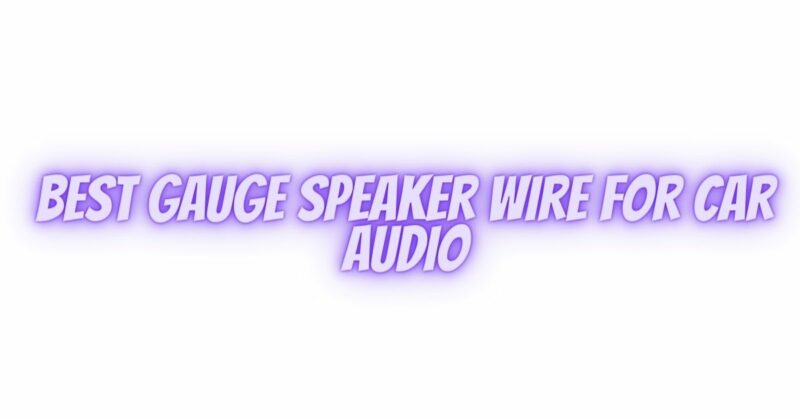Car audio enthusiasts understand that achieving the best sound quality in a vehicle requires careful consideration of various components, including speakers, amplifiers, and wiring. One critical element of car audio setup is selecting the right gauge of speaker wire. In this article, we will explore the factors that influence the choice of speaker wire gauge for car audio systems and provide guidance on selecting the best gauge for your needs.
Why Speaker Wire Gauge Matters
The gauge of speaker wire refers to its thickness or diameter, typically measured in American Wire Gauge (AWG). The gauge of wire you choose can significantly impact the performance of your car audio system. Here’s why speaker wire gauge matters:
- Electrical Resistance: Thicker wires have lower electrical resistance, which means they can transmit electrical signals more efficiently. Thinner wires have higher resistance, which can lead to voltage drop and power loss.
- Power Delivery: The power delivered to your car speakers is critical for achieving high-quality sound. If the speaker wire has too much resistance, it may limit the power that reaches your speakers, resulting in reduced volume and audio quality.
- Length of Wire Runs: Longer wire runs in your car audio setup increase resistance and voltage drop. Therefore, the appropriate gauge of speaker wire depends on the length of the wire runs.
Factors to Consider When Choosing Speaker Wire Gauge
When selecting the best gauge of speaker wire for your car audio system, consider the following factors:
- Power Requirements: Determine the power requirements of your car speakers and amplifiers. High-powered systems typically require thicker wire to deliver adequate power without significant loss.
- Length of Wire Runs: Measure the distance between your amplifier and speakers. Longer wire runs require thicker wire to minimize voltage drop and power loss.
- Amplifier Output: Check your amplifier’s specifications to see if it recommends a specific wire gauge for optimal performance. Amplifier manufacturers often provide guidelines for wire gauge based on the amplifier’s power output.
- Speaker Impedance: The impedance (measured in ohms) of your car speakers can affect the choice of wire gauge. Lower-impedance speakers (e.g., 4 ohms) may require thicker wire to maintain power delivery.
Recommended Speaker Wire Gauges for Car Audio
Here are some general guidelines for selecting the best gauge of speaker wire based on power requirements and wire run length:
- 16 AWG: Suitable for low-powered systems with short wire runs (less than 10 feet).
- 14 AWG: Ideal for mid-range systems with moderate power and short to moderate wire runs (up to 20 feet).
- 12 AWG: Recommended for higher-powered systems with longer wire runs (up to 35 feet).
- 10 AWG: Best for high-powered systems with long wire runs (over 35 feet).
It’s essential to choose a wire gauge that matches your specific car audio setup to ensure optimal power delivery and sound quality.
Conclusion
Selecting the right gauge of speaker wire is a crucial step in building a high-quality car audio system. Consider factors such as power requirements, wire run length, amplifier output, and speaker impedance to determine the best wire gauge for your needs. By choosing the appropriate speaker wire gauge, you can ensure that your car audio system delivers exceptional sound performance and enhances your driving experience.


